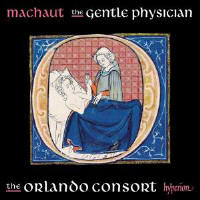Texte paru dans: / Appeared in: |
|
|
Outil de traduction ~ (Très approximatif) |
|
|
Reviewer: J.
F. Weber Titled The Gentle Physician, this is the sixth entry in Hyperion’s ongoing program of recording the polyphonic secular music of Guillaume de Machaut with the Orlando Consort, four men who sing unaccompanied. While there are no first recordings this time, the good news is the first really worthy performance of the motet Maugré mon cuer. It was first recorded by a large choir in a reverberant church (hardly suitable for a love song), then in an instrumental version. Then, inexplicably in their recording of the complete motets, Musica Nova included solo renditions of the motetus and the triplum but not the complete three-voice motet. The other major coup is Le lay de confort (S’onques dolereusement), which has had two previous recordings. The first (Fanfare 14:4) ran almost 40 minutes because each of the 12 verses was performed first vocally, then instrumentally. Then in 2000 Ensemble Colortalea recorded only verses 1, 2, 3, and 12 (the Lai de Consolation, likewise truncated on the disc, was not mentioned in the review of the Orlando Consort version of the piece in 41:1). This is a splendid performance, ranking among the best single Machaut songs on records. Of these two polyphonic lays (there are four in all), this has a three-voice canon in each of the 12 strophes. This is one of the works that Lawrence Earp identifies as defectively edited by both Besseler and Schrade, so the use of the forthcoming edition of Plumley and Palmer is an important element of this series. In addition, these are the first unaccompanied recordings of the virelais De bonté and Hélas! pour quoy; the ballade Dame, comment; and the rondeau Quant ma dame. While the series is focused on polyphonic works, each disc includes solo virelais divided among members of the group. Matthew Venner takes the first one just mentioned and Angus Smith takes the other; Je vivroie, superbly sung by Emily Van Evera (but without the third verse) long ago (7:5; CD in 11:3), is given to Donald Greig. Another positive note for the series is the consistent performance of each work complete with all the verses, not done much in former times but now more common. The songs heard here are concerned with love, especially the bad luck in love that Fortune often brings. The opening ballade, De Fortune—the Orlando Consort’s older Archiv disc (22:5) was the best of many previous versions—was widely circulated in manuscript, indicating its wide popularity. The first verse is repeated at the end of the program, this time sung in a later version that has a contratenor added. Contratenor voices were added to many of these songs by later hands. We are allowed to judge for ourselves whether the added line “enriches or obscures Machaut’s original version.” In this case, the Ludwig and Schrade editions both printed not one but two inauthentic contratenor lines, and the very first recording of De fortune added both lines to yield a most improbable five-voice rendition. Altogether, this series goes from strength to strength. I count 141 works (including solo pieces but not the Mass). Will the project be finished by the 650th anniversary of the composer’s passing? | |
|
|
|
|
|
|
|
Cliquez l'un ou l'autre
bouton pour découvrir bien d'autres critiques de CD |
|




